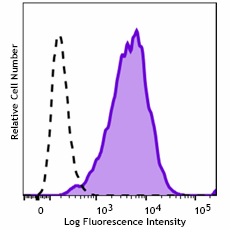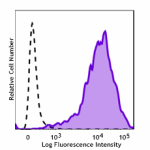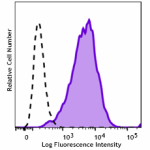- Clone
- QA19A11 (See other available formats)
- Regulatory Status
- RUO
- Isotype
- Mouse IgG1, κ
- Ave. Rating
- Submit a Review
- Product Citations
- publications

-

Human cytotrophoblastic cell line (JEG-3) was stained with anti-human HLA-G recombinant (clone QA19A11) PE (filled histogram) or mouse IgG1, κ PE isotype control (open histogram).
| Cat # | Size | Price | Save |
|---|---|---|---|
| 381803 | 25 tests | ¥26,400 | |
| 381804 | 100 tests | ¥56,100 |
HLA-G is a nonclassical MHC class I (MHC-Ib) molecule structurally related to MHC class Ia (HLA-A, B, C). There are seven isoforms of this molecule, including membrane bound HLA-G1, -G2, -G3 and -G4 and soluble HLA-G5, -G6, and -G7. HLA-G is primarily expressed on trophoblast cells. Its expression is also found on thymic epithelial cells, cytokine-activated moncytes, macrophages/dendritic cells during viral infection, and in various tumors. HLA-G exerts its inhibitory functions to regulate immune tolerance via interaction with inhibitory receptors ILT2 (CD85j), ILT4 (CD85d), and KIR2DL4 (CD158d), which is expressed on NK cells, T cells, monocytes, dendritic cells, and B cells. HLA-G is also able to bind CD8α/α, which may mediate positive and/or negative selection in the thymus.
Product DetailsProduct Details
- Verified Reactivity
- Human
- Antibody Type
- Recombinant
- Host Species
- Mouse
- Formulation
- Phosphate-buffered solution, pH 7.2, containing 0.09% sodium azide and BSA (origin USA)
- Preparation
- The antibody was purified by affinity chromatography and conjugated with PE under optimal conditions.
- Concentration
- Lot-specific (to obtain lot-specific concentration and expiration, please enter the lot number in our Certificate of Analysis online tool.)
- Storage & Handling
- The antibody solution should be stored undiluted between 2°C and 8°C, and protected from prolonged exposure to light. Do not freeze.
- Application
-
FC - Quality tested
- Recommended Usage
-
Each lot of this antibody is quality control tested by immunofluorescent staining with flow cytometric analysis. For flow cytometric staining, the suggested use of this reagent is 5 µL per million cells in 100 µL staining volume or 5 µL per 100 µL of whole blood. It is recommended that the reagent be titrated for optimal performance for each application.
- Excitation Laser
-
Blue Laser (488 nm)
Green Laser (532 nm)/Yellow-Green Laser (561 nm)
- Application Notes
-
Clone QA19A11 partially blocks the binding of reported clone MEMG/9.
- RRID
-
AB_3106085 (BioLegend Cat. No. 381803)
AB_3106085 (BioLegend Cat. No. 381804)
Antigen Details
- Structure
- Ig
- Distribution
-
Trophoblast cells, thymic epithelial cells, cytokine-activated moncytes, macrophages/dendritic cells during viral infection, various tumors
- Function
- Inhibit NK and T cell-mediated cytolysis and T cell proliferation, induce apoptosis of activated CD8+ T cells, induce Th2 cytokine production
- Interaction
- Dendritic cells, Epithelial cells, Macrophages, Monocytes
- Ligand/Receptor
- ILT2 (CD85j), ILT4 (CD85d), KIR2DL4 (CD158d), CD8α/α
- Cell Type
- Dendritic cells, Epithelial cells, Macrophages, Monocytes
- Biology Area
- Immunology
- Molecular Family
- MHC Antigens
- Antigen References
-
- Hunt JS, et al. 2005. FASEB J. 19:681.
- Carosella ED, et al. 2008. Blood. 111:4862.
- Gene ID
- 3135 View all products for this Gene ID
- UniProt
- View information about HLA-G on UniProt.org
Related FAQs
- What type of PE do you use in your conjugates?
- We use R-PE in our conjugates.
Other Formats
View All HLA-G Reagents Request Custom Conjugation| Description | Clone | Applications |
|---|---|---|
| Purified anti-human HLA-G Recombinant Antibody | QA19A11 | FC |
| PE anti-human HLA-G Recombinant Antibody | QA19A11 | FC |
| Alexa Fluor® 488 anti-human HLA-G Recombinant Antibody | QA19A11 | FC |
| APC anti-human HLA-G Recombinant Antibody | QA19A11 | FC |
Compare Data Across All Formats
This data display is provided for general comparisons between formats.
Your actual data may vary due to variations in samples, target cells, instruments and their settings, staining conditions, and other factors.
If you need assistance with selecting the best format contact our expert technical support team.
-
Purified anti-human HLA-G Recombinant Antibody

Human cytotrophoblastic cell line (JEG-3) stained with purif... -
PE anti-human HLA-G Recombinant Antibody

Human cytotrophoblastic cell line (JEG-3) was stained with a... -
Alexa Fluor® 488 anti-human HLA-G Recombinant Antibody

Human cytotrophoblastic cell line (JEG-3) was stained with a... -
APC anti-human HLA-G Recombinant Antibody

Human cytotrophoblastic cell line (JEG-3) stained with anti-...












Follow Us